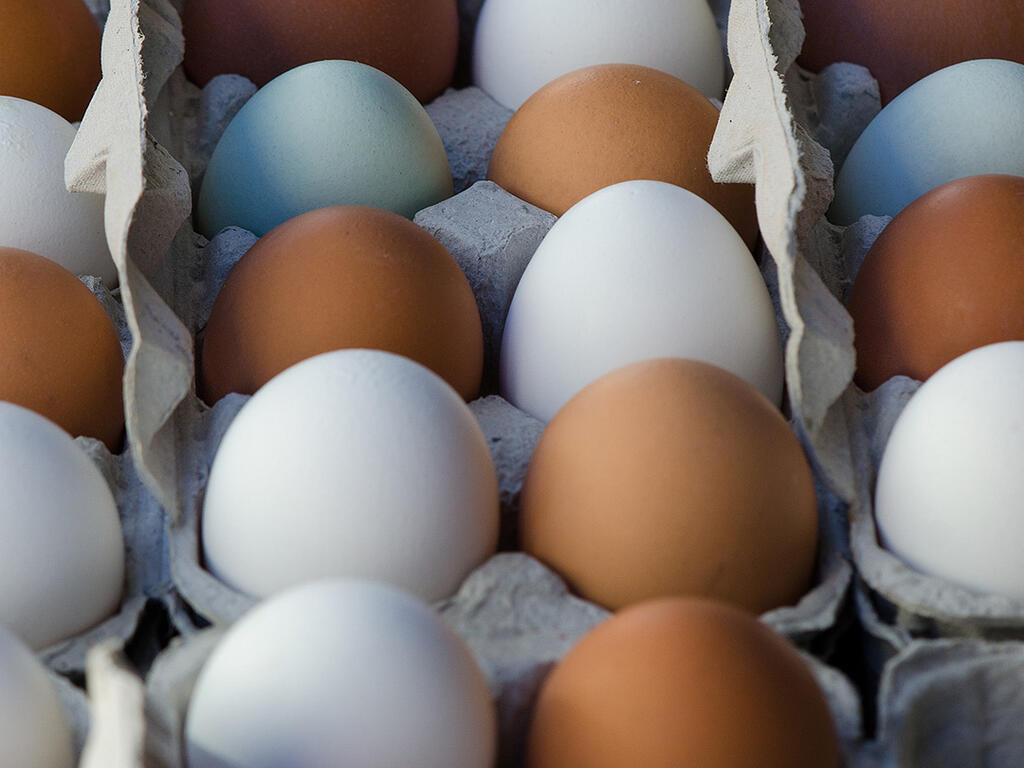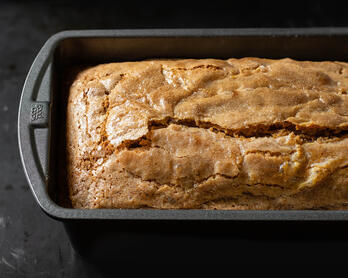Why do eggs need to be room temperature when baking?

Eggs at JF Organic Farms - Santa Monica Farmers Market
My culinary training involves cookbooks in bed, mistakes in the kitchen, and lots of time with The Google. The Internets and I are tight. I tend to Google my way down the proverbial rabbit hole, searching for bits of food intel that are helpful and/or just interesting. I'm basically a 3-year-old in the kitchen. Why does over-kneading make certain baked goods tough? Why is 160 degrees the magic number for poultry...and is that really the best number? Why?
This will be my first "Things I Googled" post. I imagine much of this information is common knowledge for trained cooks and chefs, but it's news to me so here you go.
I was making Tartine Bakery's Pumpkin Tea Cake last weekend, and as I set the eggs out it got me thinking. Why do the eggs have to be room temperature? What's the benefit? Tell me, Internets.
This is what I found.
How to Store Eggs
I know, what does this have to do with anything? The storage topic was frequently mentioned alongside information about baking and room temperature eggs. Turns out that refrigerating eggs isn't a universal practice. Anti-fridge eggheads argue that refrigeration deteriorates the quality and flavor of the egg.
Long story short, many sites suggest that eggs can be left out as long as the room/drawer maintains a stable temperature at or below 20C/68F. On the flip side, other sites say it's a health risk to do this. A debate for the ages. How long eggs will keep at room temperature depends on the freshness (farm to table vs store bought), and I've seen everything from a couple of weeks to a couple of months. That being said, if you want longevity it seems eggs are best kept refrigerated in an airtight container. I found an interesting 1977 article from Mother Earth News where they discussed a 7-month storage experiment. It's not a quick read, but they do everything from putting the eggs in a solution to rubbing them with Vaseline and lard. Fun. Also, the comments at the bottom of this article offer additional insight into the debate.
Then this begs the question...
Why do eggs go bad?

The anatomy of an egg is such that the shell is porous. According to The Exploratorium, there are as many as 17,000 tiny pores that allow air and moisture to gradually penetrate. Ultimately this spoils the contents.
So...
How to tell if an egg is bad?
- The Water Test - This is what I use when necessary. As mentioned above, since the shell is porous air is able to get into the egg over time. If you put an egg in a bowl of water and it floats to the top that means the egg is older and the air cell has grown - hence why it floats. The general wisdom is to pitch an egg that has a built-in floatie, though others say it's best to crack it open and check both the odor and consistency of the whites.
- Runny Whites - A fresh egg should have thick or viscous whites (albumen if you're nerdy). If they're watery then the egg is beyond its prime. Many websites suggest pitching said egg, but I'll admit that I've cooked runny albumen before. Ignorance is bliss.
- Smell - If it smells sulfuric or foul then it is. Pitch it.
And now for the point of all this Googling...
Why do eggs need to be room temperature when baking?
The argument for room temperature eggs is pretty convincing, though theKitchn points out that it's not always going to be catastrophic if you're in a hurry and use cold eggs. So, here are the reasons why it's important to warm your little friends up before baking.
- It's easier to whip air into room temperature eggs. This is important if fluffy is the name of the game as is the case with angel food and chiffon cakes. And in scratch brownies and soufflés whipped eggs are the only leavening agent.
- Room temperature eggs disperse more easily and evenly in the batter or dough. Since eggs aid in structure, even distribution is important for texture.
- Room temperature eggs bind more easily to other ingredients.
- The egg's fat is more easily emulsified when it's room temperature.
- If you're using melted/warm butter and then add cold eggs you may end up with a texture crisis on your hands.
How to Bring Eggs to Room Temperature
- Put them on the counter for a while. Genius.
- Put them in a bowl of luke warm water. Once the eggs don't feel cold (5-10 minutes) they're probably ready to go.
- Do.not.microwave. But what would happened if you did...microwave 173 eggs at once? That answer is here.
Conclusion
Room temperature eggs aid in fluffiness and a tender crumb. If a baking recipe doesn't specify then I plan to go with room temp. This doesn't apply to baked goods that call for cold ingredients such as pastry dough. You want the exact opposite effect in the case of flaky baked goods - i.e. you don't want even distribution of the butter, etc. That's what makes it flaky.
An important note is that older eggs don't incorporate air as easily. This can impact structure so use fresh eggs when possible.






